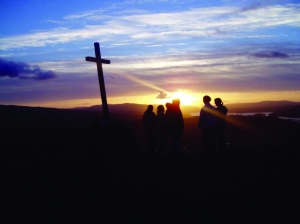Judy Garland – remember her? If you are a certain age, you will! And – the song? “Put on your Easter bonnet, with all the ribbons on it …. and join the Easter Parade.” Easter is special in the song; the occasion for a grand parade. Join the crowd, follow the band, dress up with your Easter Bonnet and all the ribbons on it. But that was a film made in Hollywood! When do you see women in hats with ribbons these days? Or, for that matter, without ribbons? At a wedding – maybe – but at Easter! Well, hat or no hat, Easter is a happy festival occasion, a time for celebration in Church. A time for ”euphonium, trombone and big bass drum”. Although I didn’t always appreciate it when I was rudely aroused from my slumbers at 7 a.m. on Easter Sunday morning; woken by the Findochty Salvation Army band parading past my bedroom window, flag a-flying, big drum beating, heralding the event, proclaiming the good news,” Christ the Lord is Risen today, Alleluia!”

The Way of the Cross at Sunset
Source: Wikimedia Commons
Fred Pratt Green, the Methodist 20th Century hymn-writer gives his hymn, ‘This joyful Eastertide’ the refrain: Come, share our Easter joy, That death could not imprison, Nor any power destroy, Our Lord who is arisen.’ But it wasn’t much like that at the dawn of the first Easter morning. When news of the Resurrection broke, we can only imagine the anger and consternation it must have caused those who engineered the events of Good Friday. Even the close friends of Jesus were disturbed and perturbed by it. Their response to the news that Christ was risen was slow, almost reluctant. The women who visited the tomb were distressed, terrified, completely at a loss. Mary was in tears. There were many bizarre ways to explain the disappearance of a dead body – resurrection the least likely. Thomas, the disciple, was not with his friends when the Risen Jesus was with them. When given the news, it was all too fantastic for words – to be taken with a pinch of salt. Later still, the Apostle Paul doing a stint of open-air preaching on Mars Hill in Athens must have been disappointed if he expected a rapturous reception. The crowd listened respectfully at first – until he mentioned the resurrection, then a section of his hearers began to mock him. Paul also found it difficult to convince the Church of the mystery and glory of the resurrection. But, preach it he must; he is convinced that, “ If Christ has not been raised from death, then we have nothing to preach and you have nothing to believe.” (strong stuff! 1 Corinthians, 15.14)
 Paul, anxious to communicate and share the joy and assurance of Easter, acknowledging the need of some further explanation, writes in his correspondence with the church at Colossae – if you think of your baptism you will begin to understand the significance of resurrection and penetrate its mystery. ( Colossians 2.12; cf also Romans 6.4.) In Paul’s day baptism would probably be mostly by total immersion in water The candidate would step into the water, probably a river and an Apostle (or some other) would plunge the convert completely under the water. In fact ‘to baptise’ is the translation of a Greek word meaning ‘to plunge.’ Paul’s linking of baptism with resurrection is simply that, apart from it being the rite of admission to the church, baptism was symbolically like dying and rising again. To be plunged under water was like being buried In the grave; when you rose out of the water – like rising from the grave.
Paul, anxious to communicate and share the joy and assurance of Easter, acknowledging the need of some further explanation, writes in his correspondence with the church at Colossae – if you think of your baptism you will begin to understand the significance of resurrection and penetrate its mystery. ( Colossians 2.12; cf also Romans 6.4.) In Paul’s day baptism would probably be mostly by total immersion in water The candidate would step into the water, probably a river and an Apostle (or some other) would plunge the convert completely under the water. In fact ‘to baptise’ is the translation of a Greek word meaning ‘to plunge.’ Paul’s linking of baptism with resurrection is simply that, apart from it being the rite of admission to the church, baptism was symbolically like dying and rising again. To be plunged under water was like being buried In the grave; when you rose out of the water – like rising from the grave.
What Paul is saying directs us to the very heart of the Easter message; when we are baptised we die with Christ and we are raised to new life with Him! We are not meant to take it literally – we cannot go back in time or go through the awful pain and agony of crucifixion or put ourselves in the shoes of Jesus’ friends standing at the entrance to an empty tomb that first Easter morning. One more thing that ties the two together – baptism and resurrection: in the first days of Christendom baptism was usually associated with a personal confession of faith. Interesting as it may be to speculate, to debate, to posses a shelf full of theological tomes, the Easter message is to be believed rather than talked about. Easter faith is not the preserve of one day in the year only, it is the faith in which Christians daily live. We are the Easter people. Let us rejoice as Fred Pratt Green’s hymn invites . . . . . . . . . share our Easter joy!

Welcome Eastertide
Source: Wikimedia Commons